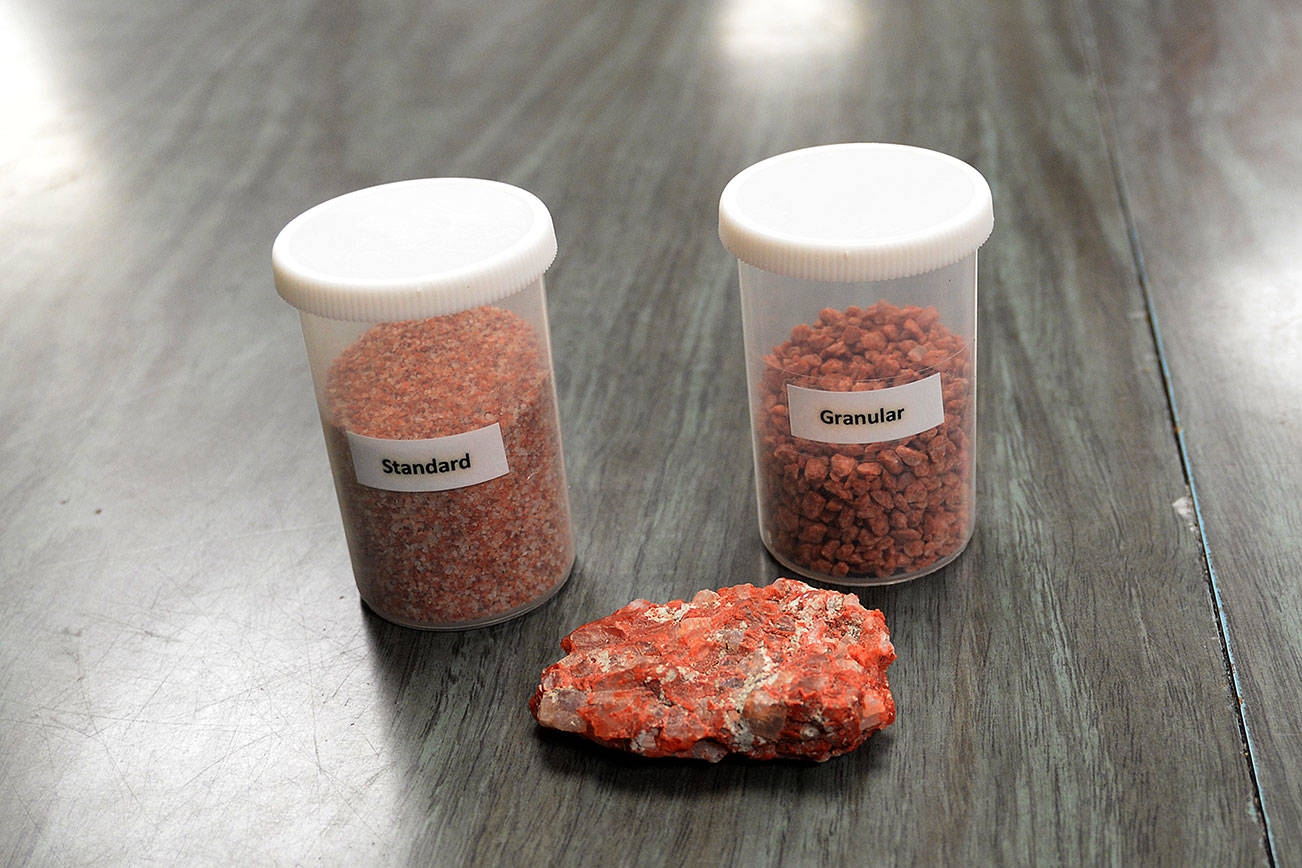About 100 people went to the Hoquiam High School Commons Thursday to learn more about a proposed potash storage and shipping facility at the Port of Grays Harbor from the company behind the proposal, BHP.
The Terminal 3 facility, located just east of Bowerman Airport, would include enough rail lines that the 177-car trains expected up to eight times a week would not have to tie up outside rail lines, said BHP Operations Manager Garry Miller. The total length of the trains coming to the Port would be about 1.6 miles long, he said.
The facility would consist of a self-contained conveyer system. Train cars are rigged to open from the bottom as they reach the conveyer, automatically dropping their payload onto belts that can either go straight to a waiting ship or into a storage facility.
BHP Manager of Corporate Affairs Ken Smith explained what potash is: potassium chloride, a naturally-occurring mineral from long-buried oceanic deposits. It is water soluble and a key ingredient in agricultural fertilizers. It, like salt, can be corrosive, so train cars will be made of stainless steel.
Smith said the potash would be trained in from the Jansen Potash Mine in Saskatchewan, Canada, some 1500 miles from the Port. When asked why the Port was in the running and not a facility in Canada, Smith explained that Hoquiam is one of two sites under consideration, the other being Vancouver, B.C.
“Timing is critical,” said Smith. The lengthy process of getting the long list of state, federal and local permits is already underway, even though the Jansen mine isn’t expected to be fully operational until 2023. That’s also when BHP analysts expect the demand to exceed current production and drive potash prices back up from the low current levels.
“The world is creating more people, but not any more land,” he said. As usable farmland disappears and more and more people need to be fed, farmers will need to find ways to increase yields on smaller chunks of ground. Potash-based fertilizers, said Smith, are known to increase yields.
BHP “firmly believes in climate change,” so the company does whatever it can to reduce harmful emissions, said a company rep about the company view on environmental impacts. The “due diligence” approach of the company includes identifying areas of the project that could impact the environment and work to minimize that impact or mitigate it. By mitigate she meant if some area is adversely impacted environmentally, BHP wound find another area in need of rehabilitation and restore that.
The conveyer belt to the docks leads to a dual quadrant ship loader. A BHP engineer said it is unique in that it is completely enclosed, and fills the ships from the bottom up, reducing any air quality issues created by dust. He added that the design of the loader also cuts down on water shadowing, another environmental concern.
Whichever port BHP chooses will have at least a 50-year commitment from the company. For example, several billions of dollars have been spent on permitting of the Jansen Mine alone. That facility employs more than 200 people, many of them contractors.
After the meeting, Port Executive Director Gary Nelson said it’s more like a 70-year or more commitment. He remarked he had never seen a company go to such great lengths to speak to everyone who could possibly be impacted by the potash project. That list includes the City of Hoquiam, the Quinault Indian Nation, environmental groups and elected local, county and state officials and more.
To further address concerns about the traffic impacts of the project and its increased train traffic, there were representatives of Puget Sound Pacific Railroad available to ask questions too, and Grays Harbor Council of Governments was on hand to talk about the East Aberdeen Mobility Project plan to improve traffic flow in that part of town.
After the meeting, participants were encouraged to speak to the BHP representative most in tune with the many facets of the project. Among the participants were Sen. Dean Takko, D-Longview, Hoquiam City Administrator Brian Shay, Port commissioners Stan Pinnick and Jack Thompson, Aberdeen Mayor Erik Larson and members of both the Hoquiam and Aberdeen city councils.
BHP is a company that extracts, processes and ships minerals, oil and gas. According to the company, BHP is among the world’s top producers of commodities including iron ore, metallurgic coal and copper. The company is based in Melbourne, Australia.



